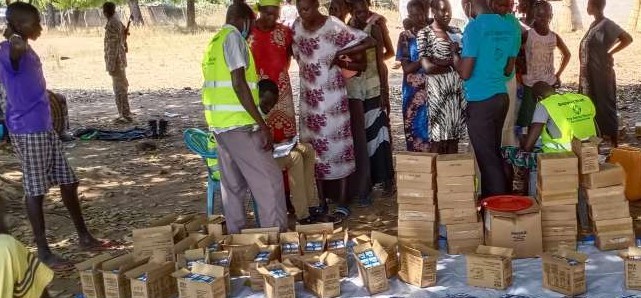A group of Sudanese and Somali traders based in Juba on Monday donated food items to internally displaced persons (IDPs) in Mangala area of Central Equatoria State.
The IDPs are residents of Bor town in Jonglei State who were displaced by recent floods.
Most houses in Bor County were submerged in floodwaters that displaced thousands of people. Most families affected by the devastating floods moved to Central Equatoria state and were resettled at Mangala in August 2020. The area is now home to approximately 90,000 displaced people.
Speaking to Radio Tamazuj, several beneficiaries welcomed the donation, saying it will support their families for some weeks. They said the donation includes flour, beans, among other food items.
Mary Atong, an old woman at the Mangala camp, said: “We were not registered because we arrived very late in December 2020. So, we have been relying on donations from well-wishers. Yesterday (Tuesday), I was given maize flour and beans.”
Another displaced, Mathiang Ciman, urged the national government and aid agencies operating in the country to intervene, saying the humanitarian situation at the camp is worsening.
“The food was only distributed to the vulnerable group. Up to now, there is no access to clean drinking water and health care services. We only rely on well-wishers for food, we really need support,” Mathiang appealed.
Akuoc Atem, the chairperson of the Mangala camp, thanked the Sudanese and Somali communities for the support, describing it as a rescue for the vulnerable group. He revealed that they had received more than 400 bags of beans and maize flour.
The camp leader called for urgent humanitarian intervention before their humanitarian situation worsens further.
Today, the International Committee of the Red Cross (ICRC) released a reporting saying communities in 9 out of the 10 states in South Sudan harvested on average 50 per cent less cereal and vegetables in 2020 than they did in 2019.
According to ICRC, food production declined due to the cumulative impact of conflict, armed violence and natural disasters.
“As the lean season begins, tens of thousands of families, especially in Jonglei, Upper Nile, Warrap, Unity and Lakes States, are struggling for survival without an adequate harvest from 2020 and following the loss of other food reserves to conflict, armed violence and floods. In the Equatoria States, communities also face a heightened risk of hunger after thousands of people fled their homes, losing crops and livestock due to ongoing conflict,” the report reads in part.




